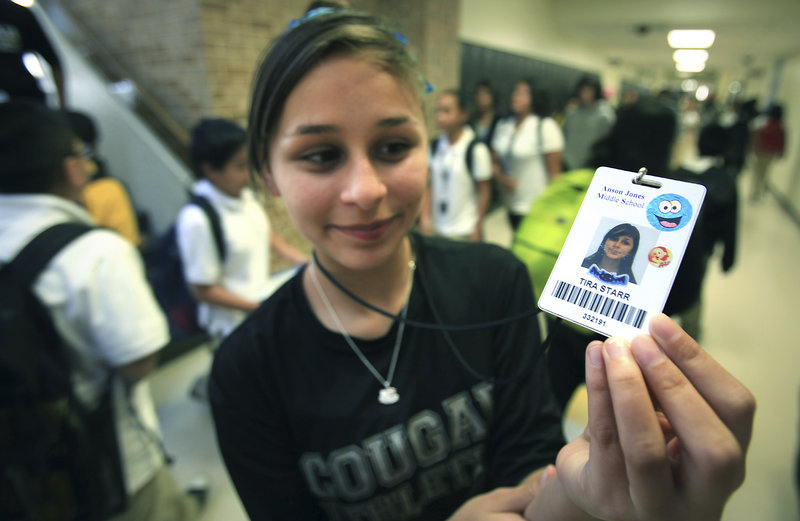AUSTIN, Texas — To 15-year-old Andrea Hernandez, the tracking microchip embedded in her student ID card is a “mark of the beast,” sacrilege to her Christian faith — not to mention how it pinpoints her location, even in the school bathroom.
But to her budget-reeling San Antonio school district, those chips carry a potential $1.7 million in funds.
Starting this fall, the fourth-largest school district in Texas is experimenting with “locator” chips in student ID badges on two of its campuses, allowing administrators to track the whereabouts of 4,200 students with GPS-like precision. Hernandez’s refusal to participate isn’t a twist on teenage rebellion, but has launched a debate over privacy and religion that has forged rare like-mindedness between typically opposing groups.
When Hernandez and her parents balked at the so-called SmartID, the school agreed to remove the chip but still required her to wear the badge. The family refused on religious grounds, stating in a lawsuit that even wearing the badge was tantamount to “submission of a false god.”
On Wednesday, a state district judge is expected to decide whether Northside Independent School District can transfer Hernandez to a different campus.
The technology isn’t new, but hasn’t exactly caught on nationwide. In 2005, the American Civil Liberties Union raised concerns about a similar initiative at a California school.
The Northside school district spent roughly $261,000 to equip students at one high school and one middle school with SmartIDs.
Yet the biggest motivation was financial. In Texas, school funding is based on daily attendance. The more students seated in homeroom when the first bell rings, the more state dollars the school receives. If a student is lingering in the hallway or the library when roll is called, the marked absence hurts the school’s bottom line.
But with the locator chips – the district doesn’t like to call them “tracking” – a clerk in the main office can find out if a student is elsewhere on campus, and if so, include them in the attendance count.
Every student found amounts to another $30 in funding, based on the school’s calculations.
Hernandez’s family isn’t convinced that tracking isn’t a motive. Nor is a Virginia-based civil rights group, The Rutherford Institute, which took up Hernandez’s cause and filed the lawsuit against the district.
Send questions/comments to the editors.



Success. Please wait for the page to reload. If the page does not reload within 5 seconds, please refresh the page.
Enter your email and password to access comments.
Hi, to comment on stories you must . This profile is in addition to your subscription and website login.
Already have a commenting profile? .
Invalid username/password.
Please check your email to confirm and complete your registration.
Only subscribers are eligible to post comments. Please subscribe or login first for digital access. Here’s why.
Use the form below to reset your password. When you've submitted your account email, we will send an email with a reset code.